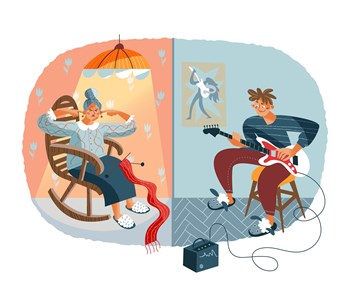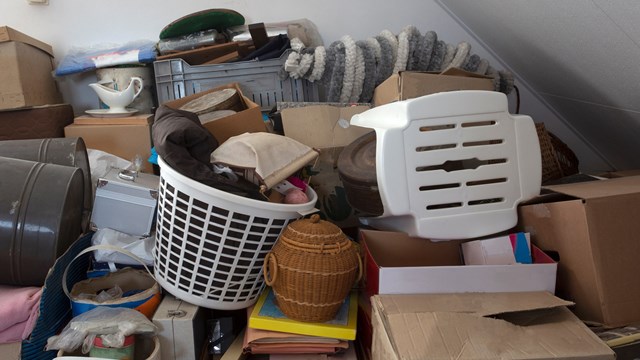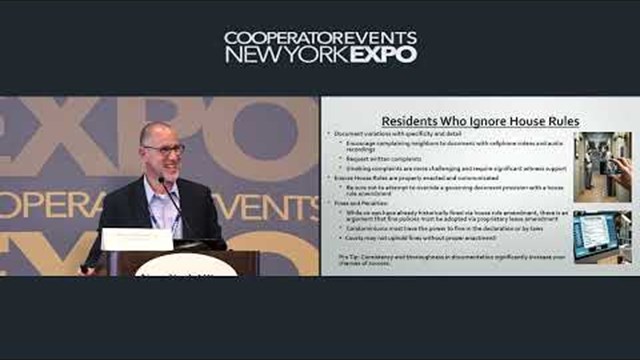
If you live in, work in, or provide services for a co-op, condo, or HOA, you know that however harmonious a building or association is in general, there is often that one person—or perhaps more than one—who throws a wrench in the works. It could be the guy who seems to take pleasure in being rude to building staff, or the lady who insists on feeding the neighborhood’s feral cats (and by extension its rats), or the parents who let their kids play basketball inside their apartment. These are the people who—at best—suck up more than their fair share of energy and resources from the community, or who—at worst—create an undesirable, unpleasant, or even dangerous living situation for themselves and their neighbors.
Whether their behavior is for attention (even the negative kind), a side effect of mental/emotional problems, a lingering effect of pandemic social upheaval, or just for the sake of being an obnoxious jerk, disruptive, combative behaviors must be addressed before they lead to long-simmering conflicts, litigation, or worse. We spoke to several pros in the industry to find out whether they think residents’ behavior has really deteriorated in recent years—and more importantly, how to deal with problematic folks when issues arise.
Who Does That?
According to Alex Kuffel, president of Manhattan-based Pride Property Management Corp., there are two classic disruptive ‘types’ he and his colleagues tend to see in multifamily settings: “There are those who innocently break the rules due to their lifestyle without knowing they’re disturbing their neighbors,” he says. “And there are those blatant, arrogant types who have no regard for their neighbors.”
Disruptive behavior can be anything ranging from a blaring entertainment system—television, radio, video gaming—to noise from visitors, to the incessant barking of an excitable dog.
But there’s a difference between a mostly-okay shareholder who’s just an occasional pain in the neck versus someone who is truly, chronically problematic and needs to be dealt with more decisively. In Kuffel’s experience, usually a truly difficult resident is someone who has no regard for the fact that he or she shares walls and common spaces with other people who have just as much right to the peaceful enjoyment of their homes as he or she does. Rules are for everybody else, and any suggestion otherwise is met with indignation and sometimes outright hostility. “Whereas someone who is just out of order might not really be aware, and simply needs to be informed and asked to cooperate,” Kuffel says, the latter type of resident actively and deliberately disregards the social contract implicit in multifamily living. “They might even retain legal support in their fight to the death to continue to do as they so please.”
COVID’s Contribution
Social scientists, psychologists and pundits will be unpacking the long-term sociocultural impacts of the coronavirus pandemic for decades, if not generations; the upheaval, fear, and isolation of the early days of the crisis, the social tension around masking and distancing as it stretched from weeks to months, and the purely practical ramifications of so many people suddenly working from home, just to name a few. That last effect has meant more interactions —not all of them pleasant—between neighbors who might only have passed each other in the lobby prior to the lockdown.
Jim Stoller, president and CEO of The Building Group, a property management firm based in Chicago, saw this phenomenon firsthand at the buildings his company manages, which are mostly luxury highrises in the city’s Gold Coast and other downtown neighborhoods. Of the COVID and post-COVID era, he says, “There’s a lot more people working from home—and there’s a lot of people who just aren’t working—so there are a lot more eyes around the building.” As the pandemic evolved, Stoller says, “there were some people who were acting out, unfortunately; pounding on walls, walking around the buildings. In some cases, they were going up to staff members and getting in their faces—just really acting inappropriately. And that did create a lot of additional stress for board members and for management, and also for the staff. Especially early on, when there were a lot of unknowns. It was a difficult period.”
While Stoller praises his staff for their dedication and hard work—as well as “the 90% of the people in the condos and co-ops that we manage [who] really are wonderful”—he notes that with so many people home all day, “there are a lot more complaints about neighbors—the smoke complaints have gone up; complaints about people hanging out in the lobby have gone up.” In many cases, says Stoller, that tension escalated to the point where management was compelled to involve the building’s or association’s attorneys.
One of those attorneys is Howard S. Dakoff, partner with Chicago-based law firm Levenfeld Pearlstein, LLC. He explains that complaints must meet a “standard of reasonableness” to be considered a violation of an association’s or corporation’s governing documents, or in the case of co-ops, the warranty of habitability. “I’ve had calls from managers [saying] that a unit owner is complaining that the vacuum in the unit above them is bothering them, that they’re trying to work and they can’t work, and they’re demanding that something be done.”
This type of complaint, he says, does not meet the reasonableness standard. People are entitled to vacuum their floors—and in a multifamily setting, it’s inevitable that some noise from such activities will penetrate the walls of adjoining units. So how should a board respond?
“What I tell boards is that there’s an aspect of this that’s not legal expertise, that’s not pure management skill—it’s psychology, dealing with owners with a little bit of tenderness, a little bit of empathy,” advises Dakoff. “Because more people are home than ever before. They’re trying to work and live in a small space, in a vertical high-rise generally. And so they’re hearing things they maybe never heard before.”
Getting Serious
While there are prescribed remedies for incidents that rise to the level of an objective violation—legal letters, fines, even eviction in extreme cases—the appropriate response to a more subjective complaint might be “a little bit of understanding and empathy,” says Dakoff. Management and the board “may be able to defuse an angry owner just by educating them.”
Such education could include reminding shareholders and owners that part of living in a co-op or condo is being a member of a community, “and also that you give up certain rights and privileges when you’re a member of a cooperative or association,” Dakoff continues. “Over the years,” he says, “and especially [in the pandemic era], we’ve had to basically tell people that if they really need total peace and quiet, that’s not going to happen in a downtown highrise. It may just be that condominium living isn’t right for them.”
Jay Cohen, president of A. Michael Tyler Realty, a management company serving co-ops and condos in Manhattan, Brooklyn, Queens, and Long Island, agrees. “There’s a lot of reasonable judgment that must go into responding to complaints,” he says, “and each must be dealt with on a case by case basis.” Cohen stresses that “[property] management is a people business. You have to take into account the human factor in dealing with these situations.”
Another factor that can add to the complexity of such situations in a residential setting is the fact that some perpetrators of objectionable behavior are living with an illness or disability that may cause or exacerbate that behavior. Sometimes, as in the case of hoarding, the behavior itself is a symptom. In these cases, association and co-op boards must act in accordance with fair housing laws, which “prohibit housing providers (including co-ops and condos) from discriminating against protected classes, including people with disabilities,” says attorney Scott J. Sandler Jr. of Sandler & Hansen LLC, a law firm based in Middletown, Connecticut.
“Associations are typically empowered to address health and safety issues,” explains Sandler, “but the practical use of that power is limited.” In cases where mental or emotional disability is a factor, the letters and fines that are normally used to curb violations are likely to be less effective, and the protections afforded to people with disabilities can make more aggressive actions—such as eviction—fraught, if not impossible. In these situations, “The association must proceed very carefully,” continues Sandler, “because it could be accused of violating federal fair housing laws.”
Sandler goes on to suggest that owners and shareholders aggrieved by their neighbors’ behavior might be better off taking matters into their own hands, since they are not constrained by fair housing laws. “Sometimes it makes more sense for an individual owner to proceed with his or her own legal action, rather than the association doing so at the expense of the community. The governing documents of many communities contain provisions that prohibit behavior that interferes with the rights of other owners to peacefully enjoy the use of their units,” he says. “Many owners expect the association to enforce these provisions. However, these provisions are incorporated into the governing documents to provide owners with their own causes of action against a neighbor who is interfering with the peaceful enjoyment of their unit. Remind [residents] of their right to seek a legal remedy on their own behalf.”
The Nuclear Option
When a violation is persistent, egregious, and goes uncured after requisite notice, then a co-op or condo may have no choice but to proceed with an eviction. Managers and attorneys alike say that this is never an option to be pursued lightly, and should only take place when all other remedies have been exhausted.
According to Peter Lehr, director of property management for the Westbury-based Kalikow Group/Kaled Management, residents can help their management company gather the facts of the issue, creating a log with the date, time, the type of problem and the duration of the issue. Lehr explains that keeping a log of disturbances or incidents provides crucial evidence and documentation, should the management company have to take the neighbor to court. “If you can’t do that or are unwilling to do that, then there’s not much that I can do to help you,” he says.
The court system may be the last word when it comes to putting a stop to disruptive behavior, says Lehr, but litigation should hardly be the first resort. He always starts by speaking with the ‘person of interest,’ then sending a formal letter, and then fining them if they refuse to remedy the problematic behavior or situation. If all those measures fail to correct the issue, only then is it time to call the attorney and take the issue to court.
“We fine, but if no one pays the fine, then the end game is the [litigation] option,” Lehr says. “But that’s a pain in the neck for everybody.”
Regardless of the reason for someone’s less-than-stellar behavior, good boards and managers must learn how to deal with all residents in an efficient, effective, and above-all, fair manner.
“I know only from personal experience that everyone has rights, no matter how demanding or annoying they might be,” Kuffel says. “We must be patient, understanding and fair—no matter how unreasonable or absurd someone might be.”
Often, he says, it’s just a matter of being logical when dealing with people —and 99 percent of the time, most people are understanding and appreciative that you took the time to listen to them and partner with them to find a reasonable solution. “For the one percent who rebel because they feel slighted, we must take them on a case-by-case basis, and allow the board to decide what options are open for consideration, and, hopefully, a successful resolution.”
Darcey Gerstein is Associate Editor and a Staff Writer for CooperatorNews.









Leave a Comment